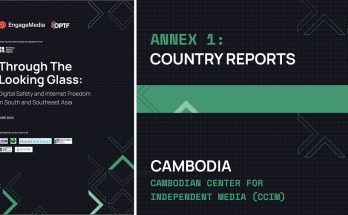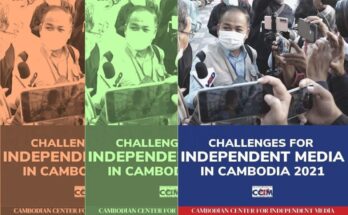A Cambodian Centre for Independent Media Community Scorecard Workshop in Sen Monorom Commune, Mondulkiri Province, July 2012.
Mondulkiri, on the Vietnamese border, is Cambodia’s biggest yet most sparsely populated province. Many villages are isolated and suffer from a lack of infrastructure, which poses problems for government and authorities.
Pu Rang Village is located about half an hour from the provincial capital of Sen Monorom, and is a part of Sen Monorom Commune.There are about 98 families, or 618 people in Pu Rang Village, and most are ethnic Phnong, an indigenous minority that lives predominantly in the northeast of the country.
The Phnong traditionally depend on the region’s rich resources for their livelihoods, but the forests, minerals and water have been threatened by rampant logging and mining activities in recent years.
Pu Rang is one of four villages featured in a January 2012 report by the NGO Forum of Cambodia, which investigates the affects of Economic Land Concessions and mining activities on indigenous communities.
In 2009, villagers say representatives from a foreign company (a BHP Billiton/ Mitsubishi Consortium) arrived unannounced and began exploring the land by drilling holes. Villagers are concerned about the affect of any future mining activites on their homes and their way of life.
The NGO Forum report states that an Economic Land Concession granted five years ago on land near the village destroyed Pu Rang’s water supply, and that villagers know from televsion and other media of the negative affects of mining exploration on other communities. Villagers are upset that they have had little communication from authorities about any mining plans and activities.
“It happened for my family – we faced this problem when we saw the company come and measure land to take, to be cut for the company,” said 25 year-old Herd Perd.
“I asked the company representatives ‘why have you come to mess with my land like this?’ Because I’m worried it will affect my house, impact my land. I asked the company representatives if they had permission from the village leader or the commune council, and they said that yes, the commune council and village leader had already given their consent.”
Villagers also believe the commune councillors have been taking bribes from mining companies. This has created an uneasy and distrustful relationship between villagers and the council, but councillors say the community’s anger is misdirected.They say they are also being excluded from discussions about the region’s mining activities.
“The company just came to this commune without providing information to the commune council,” said 41-year-old Commune Chief Ms Kwan Treil.
“They came to explore in the village. At that time village representatives complained to the commune council, looking for a resolution, for information about the impacts. So this is our worry. We worry about this problem because the process like this causes us problems with the community.”
Ms Treil said commune councillors share the community’s concerns about the possible impacts of mining.
“We are worried about the same things as the villagers have mentioned. Because we know that the companies come to explore and the dig up the land, and sometimes they don’t fill the holes, which affects the community.”
The Cambodian Centre for Independent Media ran a Community Scorecard Focus Group Discussion (FGD) over one-and-a-half days on the 23rd and 24th July 2012. CCIM spent about six weeks developing this project and has previous experience in running workshops of this kind.
Since 2010, the organisation has run public forums in 20 communes across Cambodia, involving commune councils, villagers and local authorities. However, this is the first time CCIM has run a Community Scorecard FGD, which is a smaller-scale forum focused on tackling a particular issue.
The project team consisted of Mr Nop Vy, who ran the FGD and facilitated discussion, Ms Say Phalla, who was the FGD convenor and supported the running of the sessions, and Ms Claire Slattery, an Australian volunteer who documented the proceedings.
The FGD was designed to develop understanding between villagers and their commune councillors, and to improve the way the two groups communicate.
Fifteen villagers were invited to participate in the first session, which was held outdoors under a tree in Pu Rang Village on the morning of the 23rd July. They were asked to collectively rate the council’s performance on 11 criteria, using a scale of zero (bad), to five (good), and to discuss and debate the reasons for the scores. The criteria, scores and reasons were all written down on large pieces of butchers paper, which were then hung on the tree for everyone to see and discuss.
The afternoon forum was held at the Sen Monorom Commune Council office, a simple wooden structure on Mondulkiri’s main highway.
Four councillors and the current and previous commune chiefs were asked to rate their own performance on the same 11 criteria, with CCIM again faciliting debate and summarising the discussion on butchers paper stuck up on a noticeboard. The 11 criteria all related to the council’s performance in communicating with villagers.
The first three criteria focused on how the council had performed in providing general information to the community, as well as information about ID cards, community development, new roads and infractructure. The remaining eight criteria all related to the council’s role in the region’s mining activites, including providing information on mining activities, providing information on the impact of mining activities, and provding timely information on mining exploration.
The council fared relatively well in the first three criteria, receiving scores of between three and five from both the villagers and councillors. However, the villagers affirmed their discontent with the council on mining activities, giving them scores of zero for each of the eight criteria related to the issue.
60-year-old community representative, Nhert Srave, explained the reasons for the scores:
“The council’s role providing information regarding family identification cards, the family register, and the information about community life is normal, is fine. But our big problem is what is happening with the mining companies –bauxite mining here could make big problems for me. The companies have invaded people’s land, and it has an impact on our community, including my family.”
He said people were eager for the council to know their feelings.
“We did not put scores of zero just to complain. We appreciate the commune council’s work and service, but we also need to express our real opinions about the reality of the situation that we see every day. So we expect that after this process, maybe the commune council will improve their service.”
Villager Herd Perd said the community wasn’t afraid to air their grievances, but were eager for them to be known.
“I don’t expect that the councillors will be angry or happy with this process, but it is up to them. It is their problem, their activities that they should do. We only want to know that they will be responsible to their role to provide information to the people.”
The FGD revealed the villagers were all too well aware of their rights, and knew that authorities had been abusing them and could continue to do so if things weren’t changed. Villagers also showed they were knowledgeable of the practices of EI companies, and didn’t welcome the kinds of things that had happened elsewhere to be repeated in their backyards. More suprisingly, the council also did not rate its own performance highly in relation to mining activities, mostly giving itself scores of two or three.
They did give themselves one score of five, and one of four, but both were for criteria relating to the effort they had put in to share information on mining with the villagers, suggesting that in their own eyes, they are at least trying.
Mr Nhert Srave said the scores were suprising.
“Yeah I was very surprised with the score the commune provided to itself because maybe they were also surprised and maybe they asked themselves “why are our scores so low?” like this so maybe it will push them to make improvements do better.”
56-year-old Ouort Sareoun was the commune chief for two terms up until April’s elections, and said he took some responsibility for the poor perception of the council. But he said it wasn’t entirely the council’s fault.
“Yes I acknowledge that we provided information on mining late to the community. But this is because we also got the information late from the mining companies and the provincial government. This is why we put our scores so low.”
The councillors argued that this was the crux of their problem, because the council’s role in information sharing was dependent on mining companies and other levels of government.
“I want companies to provide information to the commune council in advance, because when the commune council receives the information, we will provide it to the community,” said Ms Kwan Treil.
“And then maybe the community can provide the feedback, for example if they don’t want companies to come onto their land, or it they want the companies to respect certain areas or practices, such as cropping.”
Despite this, it became clear during the FGD that some lines of communication had broken down, including information flowing both up and down: down from higher levels of government to the commune council to the community, and up from the community to the council to the government and other authorities.
The FGD uncovered several problems with communication including:
- there was no community information board
- councillors were not regularly visiting the village
- councillors were not calling the village chief regularly
- villagers were not attending council meetings regularly
- councillors were not meeting regularly with district and provincial authorities
The FGD demonstrated that the commune council could be more proactive to improve its situation, with the information it both receives and shares.
An interface meeting with both councillors and villagers was held the following morning at the council office. The two sets of scores were compared and participants were asked to develop actions in response to the problems raised.
Both groups came up with a list of actions to improve communication for each criteria.
The actions include:
- build a new community information board
- visit the village at least twice a year
- regularly share information with the village chief by phone
- request the village chiefs to attend the council’s monthly meetings
- request meetings with the district government and the company
These actions have been listed and will be followed up by CCIM later this year. The list will also be printed on a poster to hang in the commune council office, so villagers can hold their councillors to account.
Ms Kwan Treil said councillors felt positively about the actions.
“We will try to improve our activities because it will make more understanding between the council and the community.”
CCIM’s Community Scorecard FGD provided a forum in which discussions could take place where they had previously had no other platform in which to occur.
This allowed participants to articulate their positions and explain their actions to each other.
What was known before the FGD was how the villagers felt – this had already been outlined in the NGO Forum report. What hadn’t been provided before was a platform for the community to articulate its sentiments and concerns directly to the council.
Commune Chief Kwan Treil said it also allowed the council to explain itself to the community, which was something they had not done before.
“It was a chance for us to explain to them the way that the council works. I also responded to their accusations that the commune council isn’t doing is job properly.”
It was revealed during the FGD that the council felt disempowered and excluded from communication processes involving mining companies, and that as a result, so were the villagers.
Ms Kwan Triel said she hoped through the FGD process, the community now appreciated the challenges the council faces.
“Because before, the villagers always accused the council of working closely with the mining companies, and that that’s why we didn’t act on the community’s concerns. Through this process I hope it helps the villagers understand our position.”
Indeed, village representative Nhert Srave said he felt positively about the outcomes of the FGD.
“Yes I think it has made more understanding between the commune council and the community because we’ve never received this kind of information before – through this process it will make us more clear on our suggestions, our feedback to the council.”
The forum acted as a mechanism for action – it allowed participants to collectively develop solutions to a series of related problems.
It is too early to know whether the council will fulfil the actions, but Ms Kwan Treil said they were resolved and motivated to do so.
“Hopefully now we can avoid accusations from the community that we are not doing our job. We will try to improve our current activities… we will try to communicate more regularly with the village, and we will also discuss at our monthly commune council meeting ways we can communicate better with people.”
Of course, the council’s role is only one, and a limited one, in terms of mining activities in Sen Monorom Commune.
Councillors can advocate for more information sharing, and can follow processes that are in place and introduce new ones, but to a large extent they are dependent on the district, provincial and national governments, and the mining companies, to play their parts.
In Cambodia, where corruption is a part of every day decision making and due process is rarely followed, this presents many more challenges for local government and communities.



